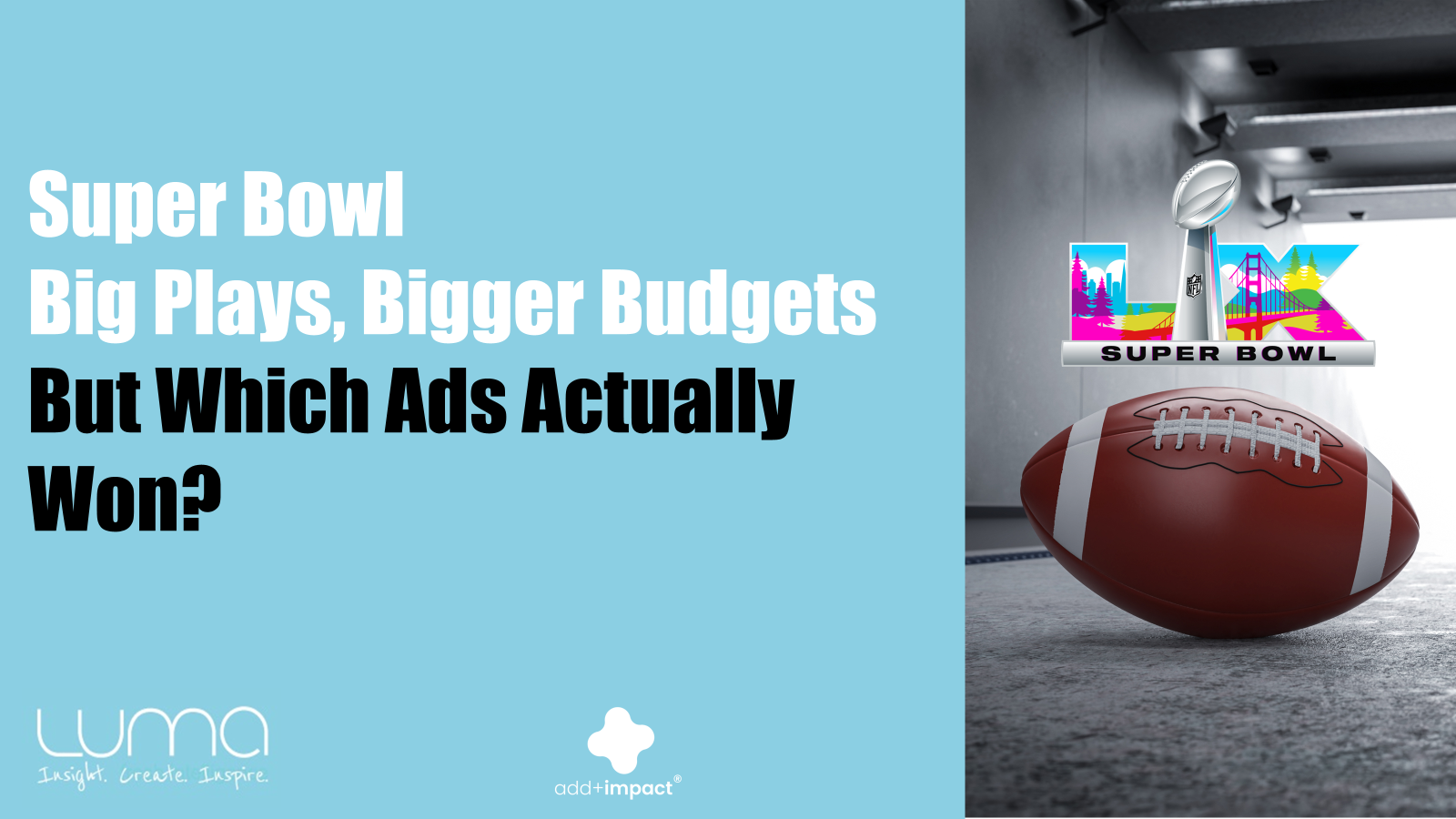SuperBowl LX saw the Seattle Seahawks defeat the New England Patriots. But, for those of us working in marketing, the real competition unfolded in the adbreaks.
Four of the most interesting ads from around the world: digging into why Christmas ads get more attention
As we head into the final lap of the Christmas race, it is a great time to reflect and learn from the 2024 Christmas campaigns.
We absolutely love Christmas ads. Every year we run our Christmas add+impact® study across the UK, USA and Australia to provide insights to our clients and to see what we can learn. We have been running our study for the past 10 years’ and we have talked to thousands of people across the globe.
One of the most interesting insights we have seen through the years is that Christmas ads tend to have higher Ad Attention than the average of other ads. Whilst it is not surprising that many of the high budget ads get noticed, it is interesting to see why they get noticed.
So, this year we have picked four of the most interesting ads from around the world and have drawn out some key insights to help us understand it further.
Use a human truth to drive emotion and in turn attention
It’ll come as no surprise to you that Christmas ads also perform well on building emotions. They are great at using storytelling and leave people feeling good. The reason brands are so good at this at Christmas is that there are a lot of human truths and insights that provide a good understanding of how we want to make viewers feel. We know the strong associations of the festive period with feelings of joy, love, anticipation and inspiration.
In the US, Amazon’s ad this year tells an uplifting story of a theatre caretaker who usually works behind the scenes. The story starts when the caretaker’s co-workers overhear him singing. The stage is then set for him to reveal his hidden talent, and his colleagues provide lighting, an instrumental backing track, and a captive audience.
With this story, Amazon clearly emphasised the joy that a simple act of thoughtfulness can bring to others. The message was amplified by using the infamous 60s Bacharach and David song ‘What the World Needs Now is Love’ which is appropriate with the tricky times we are in. This story triggered the strongest feelings of warmth, love and inspiration of all the Christmas ads we tested this year.
But can AI generated ads create an emotional response…it is not human…
One of the industry’s most talked about ads was Coca Cola’s ‘Holidays are Coming’. Versions of the ad have been around more than three decades – showing good ideas don’t wear out. But the reason for the chatter was that this year’s ad was AI-generated.
Obviously, many in the advertising world were displeased by this move from Coke. Many speculated that it just wouldn’t engage consumers. How could an AI-generated ad create a strong emotional response?
Well, interestingly, Coke’s ‘Holidays Are Coming’ ad generated the strongest feelings of joy in the US. Consumers really liked the ad, and it left them with positive emotions. This was in part linked to the borrowed equity in the famous ‘Holidays Are Coming’ soundtrack that was re-used. The song picks up on the anticipation and excitement around this time of year and signifies the start of the festive season for many.
So, while the ad may have been created by AI, the Human Intelligence at Coke clearly have the insights to know which emotional levers to pull to generate a strong response.
Does complexity build engagement or trigger tune out?
UK department store, John Lewis, has made some of the most engaging and talked about Christmas ads in past years. But one of the criticisms of past ads is that they have little to no relevance to the brand and this can be confusing – think of animated hedgehogs and penguins as family pets. Cute!
So, this year the team chose to start the ad in the John Lewis store, which is great, and then lead viewers on a mysterious journey in search of a gift. It is beautifully filmed, and the production quality is outstanding, but this year’s ad was one of the most difficult to understand.
Some may argue that confusion is good as it creates intrigue and interest. But is this true?
Hmmm – as a rule, the answer is ‘no’. Our data shows that generally, if an ad is too hard to follow, it can limit the effectiveness. The key culprits are a lack of relevance between the story and the brand, too many ideas or messages, and an idea that is too complicated or choppy.
Interestingly, when we look at all the John Lewis ads we have tested over the last decade, while they generate strong attention and emotion, many of them include complex themes. Sadly, the complexity of the ad this year limited its overall effectiveness.
Does your Christmas ad need to align to your brand code to get noticed?
All of us are aiming to build our brand salience and mental availability. We do this through our creative’s engagement as well as the use of our brand code and distinctive brand assets.
So, as part of our goal to get noticed, we also want to align our ads back to our brand. But does our brand have to stick to what we have done before, or can we mix it up? To change the way people feel, you have to change the way the brand feels.
One of the interesting and bold local ads this year was Myer’s ‘Share the Joy’. It is quite a departure from the tone and style of previous Myer ads.
‘Share the Joy’ introduces a new mascot ‘Humbug’, a Grinch-like character who is a bit naughty and disturbs the neighbourhood Christmas decorations. In the ad, a thoughtful neighbour gifts the grinch some Doc Martens so they can stomp on Christmas baubles together.
It is funny. It is cute. But is it Myer? And does it work?
Actually, the results showed that the ad built stronger attention and has better branding than the previous four Myer Christmas ads (across the past 4 years). The goal of the ad was to create a strong emotional response and a sense of positivity (in these difficult times). It delivered emotion in spades – and the strongest emotions generated were joy and warmth.
So, time to get those Christmas Carols playing. Cover the house with tinsel and get into the spirit of Christmas. The brands that lean into the joy and happiness at this time of the year are the ones who get all the gifts. Enjoy your celebrations and holidays!
From the blog


